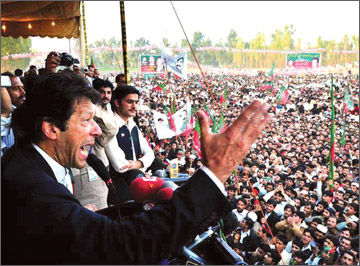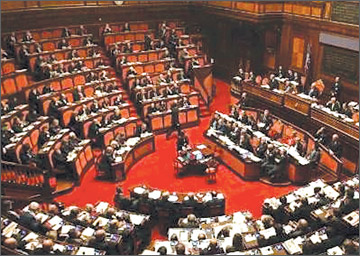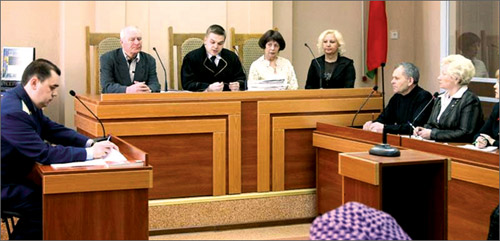Uncovering the guarded secrets
Introduction to investigative journalism:
Gaston de Rosayro
|

A political party member addressing the gathering
|
Investigative journalism is finding, reporting and presenting news
which other people try to conceal. It is very similar to standard news
reporting, except that the people at the centre of the story will
usually not help you and may even try to stop you doing your job.
The job of journalists is to let people know what is going on in the
community, the society and the world around them. Journalists do this by
finding facts and telling them to their readers or listeners.
In much of their work, the facts are easy to find in such places as
the courts and parliaments, disasters, public meetings, churches and
sporting events. People are usually happy to provide journalists with
news. Indeed, in many countries, thousands of people work full time in
public relations, giving statements, comments, press releases and other
forms of information to journalists.
Throughout the world, though, there are still a lot of things
happening which people want to keep secret. In most cases these are
private things which have no impact on other people - such as relations
within a family or a bad report from school. These personal things can
remain secret.
In many other cases, governments, companies, organisations and
individuals try to hide decisions or events which affect other people.
When a journalist tries to report on matters which somebody wants to
keep secret, this is investigative journalism.
|

Inside a parliament |
The great British newspaper publisher Lord Northcliffe once said:
“News is what somebody, somewhere wants to suppress; all the rest is
advertising.”
There are several reasons why societies need investigative
journalism. They include:
* People have a right to know about the society in which they live.
They have a right to know about decisions which may affect them, even if
people in power want to keep them secret.
* People in power - whether in government, the world of commerce, or
any other group in society - can abuse that power. They can be corrupt,
steal money, break laws and do all sorts of things which harm other
people. They might just be incompetent and unable to do their job
properly. They will usually try to keep this knowledge secret.
Journalists try to expose such abuse.
* Journalists also have a duty to watch how well people in power
perform their jobs, especially those who have been elected to public
office. Journalists should constantly ask whether such people are
keeping their election promises. Politicians and others who are not
keeping their promises may try to hide the fact; journalists should try
to expose it.
Of course, journalists are not the only people in society who should
expose incompetence, corruption, lies and broken promises. We also have
parliaments, councils, courts, commissions, the police and other
authorities.
|

A court hearing |
The police often take people to court for breaking laws. But
sometimes they do not have the time, staff or skills to catch and
correct every case of abuse. Also, they cannot do anything against
people who behave badly without actually breaking any laws.
So journalists have a role as well. The difference is that when
journalists expose wrongdoing, they cannot punish people. Journalists
can only bring wrongdoing into the light of public attention and hope
that society will do the rest, to punish wrongdoers or to change a
system which is at fault.
Who should we investigate? Journalists should be able to expose
abuse, corruption and criminal activities in all fields of public life.
These relate primarily to Governments, Companies and Criminals.
Governments: These range from local councils to national parliaments
and foreign governments. Sometimes politicians and public servants are
actually corrupt and should be exposed and removed from office.
But often they hide a decision because they know the public may not
like it. They might keep a deal they have made with a foreign timber
company secret because it will harm the environment or destroy people's
homes. Often politicians and public servants spend so long in office
that they forget that the public has the right to know what is
happening.
If the public elects people to office and gives them taxes and other
forms of wealth to administer, the public has the right to know what
they are doing. The electors should also know so that they can decide
how to vote at the next election.
Companies: Some companies break the law and should be exposed. But
companies usually like to keep activities secret for other reasons.
Perhaps they have made a mistake or lost money. You have to keep your
eye on Government-owned enterprises in particular because they are
accountable to the public.
Perhaps they do not want competitors to steal their secrets or they
do not want people to oppose a development they are planning. However,
even private companies have some responsibility towards the public.
Companies are part of each society. They usually make some use of
natural resources, take money from customers and shareholders, provide
jobs for people and use services provided by all taxpayers. Where their
activities affect the rest of the community, the community has a right
to know what they are doing.
|

A paper report on criminal activity |
Criminals: Although governments and companies can be corrupt,
criminals make their living at it. They act like leeches on the
community, so your readers and listeners have the right to know about
them. Fighting crime is, of course, mainly the job of the police and
legal system. But sometimes they do not have enough resources to do
their jobs properly. Sometimes the law itself limits their powers. Also,
the police and judiciary can sometimes be corrupt themselves. So
journalists - like every law-abiding citizen - have the duty to expose
wrongdoing.
There are, of course, all sorts of other individuals and
organisations who like to hide things which affect the public. A charity
may try to hide the fact that it is not doing a good job with money it
has been given. A football club might be secretly negotiating to move
its ground against the wishes of its fans. A man might be selling
coloured water as a cure for every illness. All these things need to be
exposed so that the public can make up its mind whether to support them
or not.
Let us discuss some basic rules about investigative reporting before
we move on to the practical techniques.
Most newspapers, radio and television stations get a lot of requests
from people to 'investigate' some alleged wrongdoing. In many cases
these are silly matters, lies or hoaxes. But you should spend some time
on each tip-off, to decide whether or not it will make a story.
You should judge all topics for investigative reporting on the
criteria for what makes news. Is it new, unusual, interesting,
significant and about people? Sometimes, the story might only affect one
person and be so trivial that it is not worth following up. Remember you
have limited time and resources, so you cannot follow every story idea.
Use your news judgment.
Next week: Fitting the facts together
|



